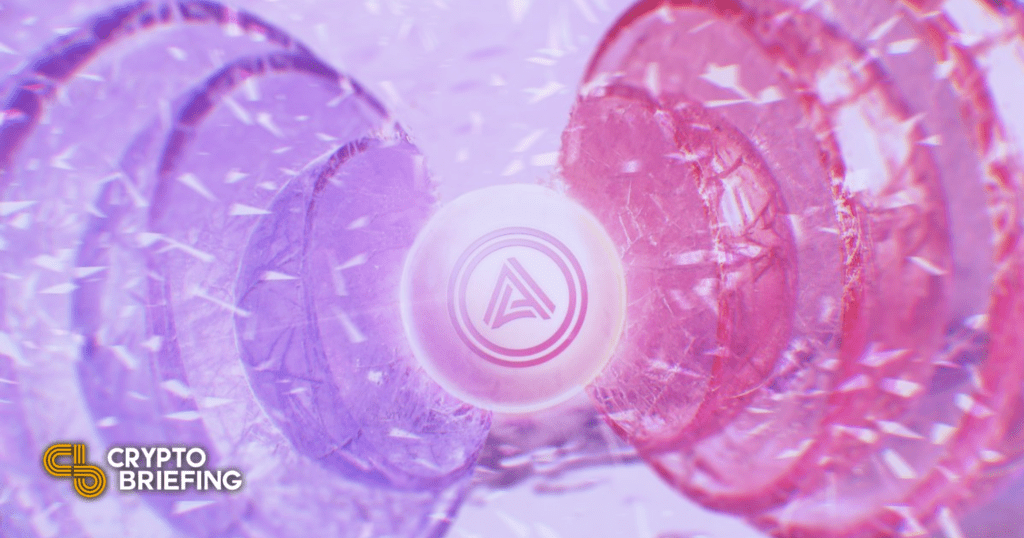
Photo: Acala
Acala Wins Polkadot’s First Parachain Auction
Acala has pipped Moonbeam to the post in Polkadot’s first parachain auction.
Share

Powered by Gloria
Acala received 32.5 million DOT worth $1.27 billion for the auction.
Acala Secures Parachain Slot
Acala has won Polkadot’s first parachain auction.
With over 32M DOT contributed by over 81,000 community members, Acala has won the first parachain auction on @Polkadot!
Thank you to everyone who took part in this historic event. (1/3) pic.twitter.com/CL2jCwA9Re
— Acala (@AcalaNetwork) November 18, 2021
The smart contract platform, which sells itself as Polkadot’s DeFi hub, announced the news late Thursday following a seven-day auction. “Thank you to everyone who took part in this historic event,” a tweet read. “We’re looking forward to kicking off the multi-chain future with you!”
Dan Reecer, VP of Growth at Acala, told Crypto Briefing that while the team had “no expectation” to win, but that it was pleased with the outcome. He added:
“We knew that the Polkadot community is thriving and incredibly supportive of all the parachains. We worked hard to educate the community, onboard them to the Polkadot wallet, and support them through the process, so it’s fantastic to see over 81,000 participants supporting Acala in the end.”
Acala received 32,515,989.5 DOT worth roughly $1.27 billion from 81,218 contributors. Based on the total DOT received, Acala will distribute 105,893,309.1 ACA tokens to its community of contributors. Additionally, 24,116,159.8 LCDOT tokens will be distributed to crowdloan backers for use in the Acala Network. LCDOT is a liquid token that represents DOT while it’s locked up.
Acala is one of the leading projects built on Polkadot. It’s hoping to become the home of DeFi on the network, with plans to launch products like an automated market maker, liquid DOT staking, and a decentralized stablecoin called aUSD. Acala is also optimizing for interoperability with the Ethereum Virtual Machine.
To be eligible to join the network, projects must secure one of 100 parachains, individual blockchains that connect to Polkadot’s Relay Chain to make the network scalable and interoperable.
Polkadot is currently in the process of holding auctions for projects hoping to join the network. In each auction, projects must raise funds in the form of Polkadot’s DOT token from their respective communities. The DOT gets locked until the parachain lease expires. To reward users for contributing DOT, projects typically native tokens. In this case, contributors will receive Acala’s ACA token.
The first parachain auction launched last week and saw fierce competition between Acala and the cross-chain platform Moonbeam. Soon after launch, both projects had raised millions of DOT tokens, significantly outpacing every other entrant by a significant margin. Interestingly, data from DotMarketCap shows that Moonbeam received more DOT than Acala with 34,161,504 tokens contributed, but Acala won due to the candle auction format.
The winner of the auction was determined by the project that had the most DOT contributed at a randomly selected point. The candle blew out at 20:32:42 on Nov. 15, at which point Acala was leading. The Moonbeam team congratulated Acala on winning the slot, commenting that “Polkadot’s success will be reflected in the activity that all its parachains will bring to its ecosystem.”
Reecer told Crypto Briefing that Acala would launch on Dec. 18, with plans to roll out its Liquid DOT staking, the aUSD stablecoin, and automated market maker to follow into next year. “We are really excited for all that is to come in 2022 and beyond,” he said. Acala will have the parachain lease until it expires on Oct. 20, 2023.
The first set of parachain auctions are due to run weekly from November through December, with the next one commencing today. An initial 11 slots are up for auction. The second batch of auctions will commence on Dec. 23 and run fortnightly. Each one is due to last seven days.
Disclosure: At the time of writing, the author of this feature owned ETH and several other cryptocurrencies.
